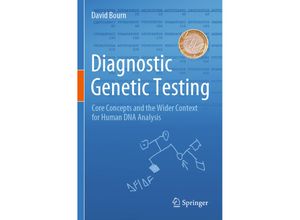Over the last decade technical advances have allowed genomic testing which provides a great
opportunity for diagnosis but also an increased chance of uncertain or unexpected findings.
This book addresses many of the questions that arise in this context and summarizes the
essential concepts in diagnostic genetic testing in an easy-to-read manner. It also covers some
broad context for the practical and ethical implications of examining human DNA sequences. The
book starts with a general introduction to the field providing enough background to allow
readers without any previous education in genetics to comprehend the material in the subsequent
chapters. The main part explores differing aspects of human genetics and the wider implications
of testing in these areas. The author covers not only single gene inheritance but also genetic
testing of cancers and how testing benefits the patients. Special emphasis is also given to the
questions of genetics and identity. The concluding part then draws the main themes together and
summarises the wider significance of genetics. It also explores the gap between promises made
for the impact of advances in genetics and the actual benefits to patients. The book is
written for everyone interested to learn about the process of genetic testing and the broader
implications. Moreover it is aimed at health professionals with an interest in genetics at
students or scientific trainees looking for an introduction to diagnostic genetics and at
professionals in health policy or health journalism.



